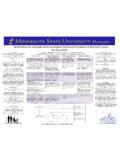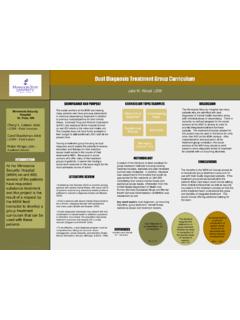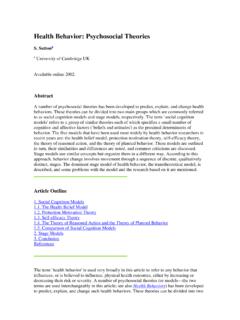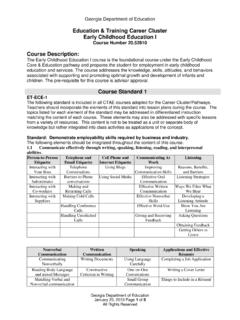Transcription of Acute Psychiatric Group Therapy for Individuals with ...
1 Acute Psychiatric Group Therapy for Hospitalized Individuals with Serious and Persistent Mental Illness Lindsey Bednar, LSW, Minnesota State University, Mankato, Department of Social Work Introduction Figure 1-Immanuel St. Joseph's Behavioral Health Unit Diagnoses Literature Review Many studies have addressed the components of intervention that are most important for Individuals with Mental illness is a medical condition that one in 17 Americans suffer. It impairs their moods, feelings, interpersonal bipolar disorder, borderline personality disorder, major depressive disorder and schizophrenia. The relationships, and daily functioning. With treatment, between 70 and 90 percent of Individuals can have improved literature shows that with successful intervention at a Group therapeutic level, Individuals will have well-being.
2 Without it, many will become homeless, inappropriately incarcerated, or take their own lives (NAMI, 2009). Bipolar Disorder Borderline increased success as represented in Figure 4. 17% Personality Statement of Purpose Other Disorder 37% Bipolar Disorder- Bipolar Disorder is a mood disorder in which approximately two million American 2%. adults live with and is characterized when the individual experiences one or more manic episodes that The purpose of this study was to identify Group Therapy interventions to be provided during a time limited Acute alternate with major depression, similar to a rollercoaster effect (APA, 2000). Psychiatric hospitalization for Individuals with serious and persistent mental illness (SPMI) derived from evidenced- Major Depressive based research.
3 Disorder Borderline Personality Disorder-According to the DSM-IV-TR (2000), borderline personality disorder is 35%. a pattern of instability in interpersonal relationships, self-image, and unmarked impulsivity that begins in Research Question early adulthood. Borderline Individuals make up 20 percent of the Psychiatric inpatients served and is observed in two percent of the total population. What skills deficits and theory of practice are most efficacious with Individuals with SPMI diagnosis served by ISJ Schizophrenia 9%. Behavioral Health Unit? Major Depressive Disorder-The literature review demonstrated that Major Depressive Disorder is characterized by the individual having one or more major depressive episodes without a history of manic, Figure 2-Skills Deficits to Address in Group Therapy mixed, or hypomanic episodes (APA, 2000).
4 It is a disorder that impacts percent of Individuals in Immanuel St Joseph's Behavioral Health Unit Insight-Oriented Skills Problem Solving Thinking Consequential Relationship Skills the United States. The research shows that percent of these Individuals have a comorbid disorder, Coping Strategies Schedule/Interper Activities of Daily Vocational Skills sonal and social rhythm Therapy Recognition of Goal Setting most commonly being anxiety. Symptoms Social/. Immanuel St Joseph's (ISJ) Hospital is an owned affiliate of Mayo Clinic in Rochester and serves as a regional hub Living for southern Minnesota. The behavioral health unit at ISJ provides mental health services to adults in a crisis situation in a secure setting. Schizophrenia- Schizophrenia is a chronic, mental disorder that is characterized by abnormal patters of thoughts and perception, that impacts one in one hundred people at some point in their lives (McCann &.)
5 Within the 12 bed behavioral health unit, adults between the ages of 18-50 represent percent of those Bipolar X X X X X X X X Bowers, 2005). While the specific causes of schizophrenia are unknown, the onset of schizophrenia is admitted. Of those admitted, they have a multitude of diagnoses and stay for a varying amount of time with the Disorder likely due to a mix of biological, psychological, and social influences and can often be detected average length of stay at days. While the specific diagnoses represented over the last six months is broken Borderline X X X X X X X. Personality premorbid in symptoms such as social withdrawal, deterioration in self-care, and other odd behaviors down into fifty-nine different diagnoses, representing 205 admissions (some Individuals with multiple admissions), (Corcoran & Walsh, 2009).
6 Disorder 61percent of the recorded diagnoses fell into the definition of (SPMI) within one of the four diagnoses, including: major depression (n=72), bipolar disorder (n=35), schizophrenia (n=18) or borderline personality disorders (n=4). The population of patients that are identified as other in Figure 1 are represented by a multitude of varying Major X X X X X Individuals with a diagnosis of SPMI represent six percent of the Americans, and often carry a level of diagnoses that were too indiscriminant to break down into further groups. Depressive skill deficit that impairs their daily relationships and functioning (NAMI, 2009). Research has shown that Disorder with successful intervention many Individuals with SPMI can reduce the impact that their diagnosis has Evidenced-Based Practice and the Need for it on the Behavioral Health Unit Schizophrenia X X X X X X on their life.
7 Until the 1980's, the most effective and highly used treatment of Individuals with SPMI was neuroleptic medication (McCann & Bowers, 2005). Within the last couple decades, specialists have Evidenced-based practice is a process that integrates current research along with clinical expertise and patient attempted to develop alternative treatment models to assist these Individuals with SPMI. needs for effective treatments of specific problems. With time-limited hospitalization of Individuals with varying Figure 3-Effective Therapy Techniques diagnoses, it is imperative that groups emanate from evidenced-based research and are based on best practice models. To practice with effective treatment, the treatment should be evidenced-based and theory driven (Malloch & Cognitive Psychoeducation Dialectical Brief Interpersonal While the use of medications as a primary treatment modality for SPMI will not be replaced by Porter-O'Grady, 2006).
8 Behavioral Behavior Psychodynamic Therapy psychosocial intervention, research has shown that psychological and social interventions can reduce Therapy Therapy Intervention symptoms and relapse rates. There are many skills to address in groups and theories to practice, yet Bipolar X X evidenced-based research has consistently shown that cognitive-behavior Therapy and social skills Serious and Persistent Mental Illness Disorder training are successful (McCann & Bowers,2005). Borderline X X X. There is an ongoing debate over the most universal definition of serious and persistent mental illness (SPMI). Personality Authors disagree on duration, diagnosis and severity, but many agree that it is a medical condition that disrupts an Disorder Meuser and Drake (2005) identified nine major domains of meaningful outcomes for Individuals with Individuals thinking, mood, feeling, daily functioning, and ability to relate to others (American Psychiatric Association Major X X X X SPMI when their areas of deficit are addressed with appropriate intervention.)
9 The major domains [APA], 2000). When attempting to designate a diagnosis to the definition of SPMI, many authors tend utilize the Depressive include: 1) reduction of symptom, 2) improvements of social and role functioning, 3) increased self-care diagnoses of major depression, schizophrenia, bipolar disorder, borderline personality disorder, and, in less used Disorder definitions, obsessive compulsive disorder, panic disorder and post traumatic stress disorder where also identified skills, 4) increased independent living skills, 5) reduction in hospitalizations, 6) securing stable and Schizophrenia X X. (Spollen, 2003). For the purpose of this research review, the four primary diagnoses that were most evident were independent housing, 7) enhanced quality of life, 8) better control of substance abuse, and 9).
10 Appropriate in X X X X. studied and include: major depression, schizophrenia, bipolar disorder, and borderline personality disorder. a short-term, improvements in general health. It is these domains, that motivate professionals to develop efficacious inpatient programs. setting Methodology Findings Figure 4-Outcomes of Successful Group Therapy A systematic review of literature was conducted supporting evidenced-based practices on Group Therapy . The data Techniques was collected from journal sources that produced research on studies of therapeutic treatment of Individuals with Results of the literature review indicated that the skills that should be addressed through Group Therapy in an Treatment Gains Reoccurrence of bipolar disorder, borderline personality disorder, major depressive disorder, and schizophrenia.








